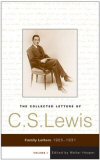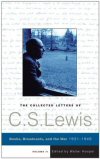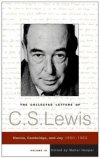The Collected Letters of C.S. Lewis, Volumes 1–3
Digital Logos Edition
Due to rights limitations, we are unable to sell these resources individually.
Overview
The life and mind of C.S. Lewis have fascinated those who have read his works. This collection of his personal letters reveals a unique intellectual journey and deals with all of Lewis’ interests—theology, literary criticism, poetry, fantasy, children’s stories—as well as his relationships with family members and friends. C.S. Lewis was a prolific letter writer, and his personal correspondence reveals much of his private life, reflections, friendships, and the progress of his thought. Walter Hooper’s insightful notes and comprehensive biographical appendix of the correspondents make this an irreplaceable reference for those curious about the life and work of one of the most creative minds of the modern era.
In the Logos editions, these volumes are enhanced by amazing functionality. Important terms link to dictionaries, encyclopedias, and a wealth of other resources in your digital library. Perform powerful searches to find exactly what you’re looking for. Take the discussion with you using tablet and mobile apps. With Logos Bible Software, the most efficient and comprehensive research tools are in one place, so you get the most out of your study.
Get this 3 volume set as part of The C.S. Lewis Collection today!
- Includes letters that deal with Lewis’ interests as well as relationships
- Reveals much of Lewis’ private life, reflections, friendships, and the progress of his thought
- Provides a special section of newly found letters from earlier time periods
Top Highlights
“I think every natural thing which is not in itself sinful can become the servant of the spiritual life, but none is automatically so.” (Volume 3, Page 731)
“The first essential point for a letter writer to master is that of making himself intelligable to his reader.” (Volume 1, Page 104)
“Before the service was over-one cd. wish these things came more seasonably-I was struck by an idea for a book wh. I think might be both useful and entertaining. It wd. be called As one Devil to Another and would consist of letters from an elderly retired devil to a young devil who has just started work on his first ‘patient’.310 The idea wd. be to give all the psychology of temptation from the other point of view. e.g. ‘About undermining his faith in prayer, I don’t think you need have any difficulty with his intellect, provided you never say the wrong thing at the wrong moment.” (Volume 2, Pages 426–427)
“It is Christ Himself, not the Bible, who is the true word of God. The Bible, read in the right spirit and with the guidance of good teachers will bring us to Him. When it becomes really necessary (i.e. for our spiritual life, not for controversy or curiosity) to know whether a particular passage is rightly translated or is Myth (but of course Myth specially chosen by God from among countless Myths to carry a spiritual truth) or history, we shall no doubt be guided to the right answer.” (Volume 3, Page 246)
“Devotion is best raised when we intend something else. At least that is my experience. Sit down to meditate devotionally on a single verse, and nothing happens. Hammer your way through a continued argument, just as you would in a profane writer, and the heart will sometimes sing unbidden.” (Volume 2, Page 136)
- Title: The Collected Letters of C.S. Lewis, Volumes 1–3
- Author: C.S. Lewis
- Editor: Walter Hooper
- Series: The Collected Letters of C.S. Lewis
- Publisher: HarperOne
- Volumes: 3
- Pages: 4,064
- Christian Group: Evangelical and Anglican
- Resource Type: Collected Works
- Topic: Christianity and Culture

The Collected Letters of C.S. Lewis, vol. 1: Family Letters 1905–1931
- Author: C.S. Lewis
- Editor: Walter Hooper
- Series: The Collected Letters of C.S. Lewis
- Publisher: HarperOne
- Publication Date: 2004
- Pages: 1,072
The first of a three–volume collection, this volume contains letters from C.S. Lewis’ boyhood, his army days in World War I, and his early academic life at Oxford. Here we encounter the creative, imaginative seeds that gave birth to some of his most famous works.
The Collected Letters of C. S. Lewis, vol. 1 offers an inside perspective to Lewis’ thinking during his formative years. Walter Hooper’s insightful notes and biographical appendix of all the correspondents make this an irreplaceable reference for those curious about the life and work of one of the most creative minds of the modern era.
As we witness Lewis develop we find that these volumes are working as a kind of unconscious autobiography.
—Books & Culture

The Collected Letters of C.S. Lewis, vol. 2: Books, Broadcasts, and the War 1931–1949
- Author: C.S. Lewis
- Editor: Walter Hooper
- Series: The Collected Letters of C.S. Lewis
- Publisher: HarperOne
- Publication Date: 2004
- Pages: 1,152
This second of a three–volume collection contains the letters Lewis wrote after his conversion to Christianity, as he began a lifetime of serious writing. Lewis corresponded with many of the twentieth century’s major literary figures, including J.R.R. Tolkien and Dorothy Sayers. Here we encounter a surge of letters in response to a new audience of laypeople who wrote to him after the great success of his BBC radio broadcasts during World War II—talks that would ultimately become his masterwork, Mere Christianity.
Volume II begins with C.S. Lewis writing his first major work of literary history, The Allegory of Love, which established him as a scholar with imaginative power. These letters trace his creative journey and recount his new circle of friends, “The Inklings,” who meet regularly to share their writing. Tolkien reads aloud chapters of his unfinished The Lord of the Rings, while Lewis shares portions of his first novel, Out of the Silent Planet. Lewis’ weekly letters to his brother, Warnie, away serving in the army during World War II, lead him to begin writing his first spiritual work, The Problem of Pain.
After the serialization of The Screwtape Letters, the director of religious broadcasting at the BBC approached Lewis and the “Mere Christianity” talks were born. With his new broadcasting career, Lewis was inundated with letters from all over the world. His faithful, thoughtful responses to numerous questions reveal the clarity and wisdom of his theological and intellectual beliefs.
Volume II includes Lewis’ correspondence with great writers such as Owen Barfield, Arthur C. Clarke, Sheldon Vanauken, and Dom Bede Griffiths. The letters address many of Lewis’ interests—theology, literary criticism, poetry, fantasy, and children’s stories—as well as reveal his relationships with close friends and family. But what is apparent throughout this volume is how this quiet bachelor professor in England touched the lives of many through an amazing discipline of personal correspondence. Walter Hooper’s insightful notes and compre hensive biographical appendix of the correspondents make this an irreplaceable reference for those curious about the life and work of one of the most creative minds of the modern era.
The Collected Letters of C. S. Lewis, vol. 1 offers an inside perspective to Lewis’ thinking during his formative years. Walter Hooper’s insightful notes and biographical appendix of all the correspondents make this an irreplaceable reference for those curious about the life and work of one of the most creative minds of the modern era.

The Collected Letters of C.S. Lewis, vol. 3: Narnia, Cambridge, and Joy 1950–1963
- Author: C.S. Lewis
- Editor: Walter Hooper
- Series: The Collected Letters of C.S. Lewis
- Publisher: HarperOne
- Publication Date: 2007
- Pages: 1,840
This collection, carefully chosen and arranged by Walter Hooper, is the most extensive collection of Lewis’ letters ever published. Included here are the letters Lewis wrote to such luminaries as J.R.R. Tolkien, Owen Barfield, Arthur C. Clarke, Sheldon Vanauken, and Dom Bede Griffiths. To some particular friends, such as Dorothy L. Sayers, Lewis wrote as many as fifty letters. The letters deal with all of Lewis’ interests–theology, literary criticism, poetry, fantasy, children’s stories–as well as his relationships with family members and friends.
The third and final volume begins with Lewis, already a household name from his BBC radio broadcasts and popular spiritual books, on the cusp of publishing his most famous and enduring book, The Lion, the Witch and the Wardrobe, which would ensure his immortality in the literary world. It covers his relationship with and marriage to Joy Davidman Gresham, subject of the film Shadowlands, and includes letters right up to his death on November 22, 1963, the day John F. Kennedy was assassinated.
This volume also includes both a special section of newly found letters from earlier time periods covered in volumes one and two and mini–biographies of Lewis’ regular correspondents.